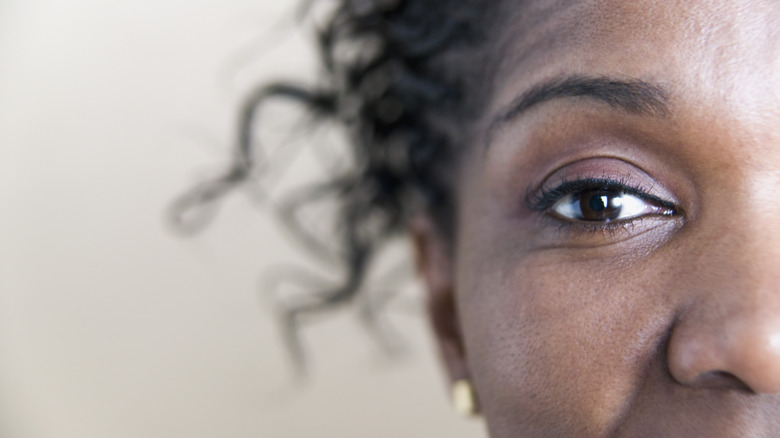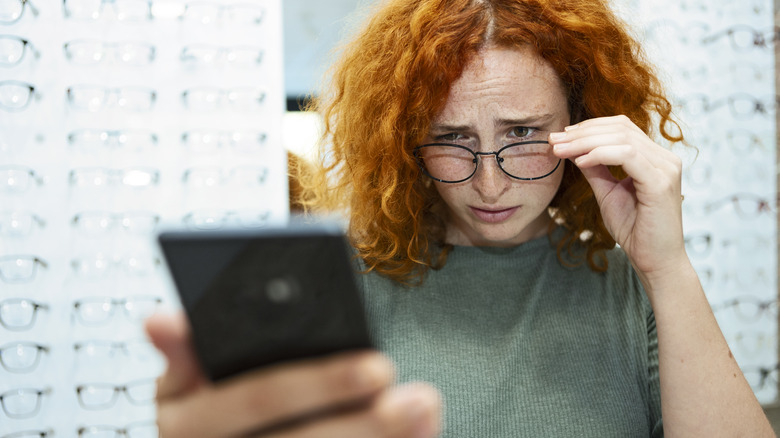Do Our Eyes Get Bigger As We Age?
The eyes are the window to the soul. This is a saying we've probably heard a few times. Apart from the fact that they add originality to every human being, there are also surprising things your eyes reveal about your health. Everything about the eyes and how they evolve through our lifetime is intriguing. Did you know that a human embryo doesn't have peepers at first? (via Healthline). Vision is one of the last senses that a baby develops and in the infant stages, eyesight isn't as strong or useful as it will be when someone turns 19. Ever noticed how a baby can't focus on anything other than what's directly in front of their face?
Turns out, it's not only the strength of our eyes that changes over time, but the size does too. Our eyes actually get bigger as we age. When we're born, our eyes are a little smaller than a dime, per WebMD. That's about 16.5 millimeters in diameter. The first two years are when the initial growth spurt happens (via Calgary Optometry). This is when children develop sensitivity to light, and their focus, tracking, and depth perception sharpens.
The second growth spurt happens during puberty. By the time you turn 21, your eyes have gotten bigger. They've grown as much as they can and will measure at about 24 millimeters in diameter. What happens after this stage?
Your eye function and how your eyes look change as you age
While your eyes do stop getting bigger after your teen years, the function of your eyes continues to change as you age. Mostly, this has to do with the changes in vision that happen in your 30s, 40s, 50s, and thereafter.
After age 40, you might develop presbyopia or farsightedness, per WebMD. This is characterized by the lenses in your eyes becoming less flexible which might mean that you find it difficult to read labels or other letterings held close to you. This explains why people in their middle age hold their books further away from them when they read. You might benefit from reading glasses at this stage, per American Academy of Ophthalmology. After you turn 60, you might experience various problems with vision like cataracts, glaucoma, and macular degeneration (via Healthline). In fact, according to the American Academy of Ophthalmology, as many as one in three Americans aged 65 will develop vision issues. The presence of underlying health conditions can contribute to the development of eye-related problems.
Apart from function, how your eyes look also changes over time. While the weight of your eyes continues to grow at 1.38 milligrams every year, your eyes will also start to look yellow or brown with UV and other environmental exposures, per Calgary Optometry. You will also notice puffiness, droopiness, and changes in eye color. Tearing or dry eyes as you age is also common. Going back to eye shape, there is one other thing that might alter it in your lifetime.
Staring at screens all day can have an impact on eye shape
There is some research to suggest that spending long hours staring at phone screens and laptops can actually elongate our eyes (via The Guardian). This lengthening of the eyes doesn't have to do with age-related growth as mentioned before though. It has to do with the development of several vision problems, including but not limited to, myopia (nearsightedness).
Miami, Florida-based optometrist, Dr. Eric Chow told The Guardian, "We can clinically measure the millimeter lengthening of the eyeball. Studies have shown that the longer the axial length, the higher the risk of eye diseases like glaucoma, retinal detachment, and cataracts."
Researchers also believe that the pandemic contributed to vision problems. A 2021 study conducted on 123, 535 children, aged 6-8, published in JAMA Ophthalmology found a considerable increase in myopia in 2020 when compared with five years prior. Myopia had increased by 1.4 to 3 times. Pediatric ophthalmologist at Houston Eye Associates, Dr. Aaron Miller told The Guardian, "The shape of the eye is round like a basketball. When an eye becomes nearsighted, myopic, the eye is longer, like a grape or olive." If you want to retain your vision and support eye health, it might be wise to cut down on screen time and maintain regular checkups with an optometrist. Protecting your eyes from the sun, eating healthy, and exercising can also help. Eye health is also about the bigger picture, so pay attention to blood pressure and blood glucose levels too.



